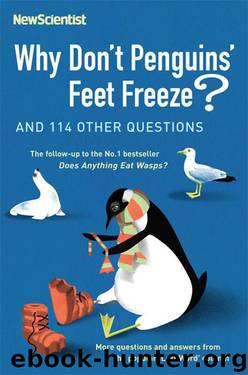Why Dont Penguins Feet Freeze by New Scientist Magazine Staff

Author:New Scientist Magazine Staff [Staff, New Scientist Magazine]
Language: eng
Format: epub, mobi
Tags: Science, Questions and Answers, General
Publisher: Profile Books
Published: 2006-01-01T23:00:00+00:00
Beer is ‘raw’ immediately after fermentation, and any harsh sugars that are present, such as the Belgian candy used in some beers, burn the nose, while the hops taste like freshly cut grass. The conditioning, or lagering, period is a very slow fermentation during which these raw flavours mellow and the subtler flavours increase in complexity.
At some point the beer reaches its peak of flavour and starts losing taste. A pale ale might peak between one and three months after fermentation, while a high-gravity imperial stout could still be developing years later. Many beer experts think that US-style Budweiser is a very light taste to begin with and that because their breweries have strong quality control over every step of their process, they can reduce the need for longer maturation and clarification periods without affecting the taste too much. European lagers, on the other hand, have longer lagering periods because they are far more complex in taste.
After pasteurisation, beer is essentially defenceless against degradation. Any temperature swings between the brewery and consumption spoil the taste. Even worse, compounds known as alpha acids from the hops are light-sensitive – photons break down the isohumulones in the liquid, creating 3-methyl-2-butene-1-thiol, which gives the beer a skunky smell and taste. And yes, it really is the same compound found in skunk spray. Brown bottles slow this process, but clear and green bottles provide almost no protection. Some brewers use chemically modified hop compounds that are resistant to skunking, but even so it is best to use an opaque container, and a steel cask beats anything else.
So both adverts are correct. You need a conditioning period for the flavour of the beer to peak, however long that may be. But once you reach that peak you would ideally drink it immediately, especially if it is pasteurised.
Ron Dippold
Brewer
San Diego, California, US
Download
Why Dont Penguins Feet Freeze by New Scientist Magazine Staff.mobi
This site does not store any files on its server. We only index and link to content provided by other sites. Please contact the content providers to delete copyright contents if any and email us, we'll remove relevant links or contents immediately.
What's Done in Darkness by Kayla Perrin(26961)
The Ultimate Python Exercise Book: 700 Practical Exercises for Beginners with Quiz Questions by Copy(20859)
De Souza H. Master the Age of Artificial Intelligences. The Basic Guide...2024 by Unknown(20618)
D:\Jan\FTP\HOL\Work\Alien Breed - Tower Assault CD32 Alien Breed II - The Horror Continues Manual 1.jpg by PDFCreator(20539)
The Fifty Shades Trilogy & Grey by E L James(19465)
Shot Through the Heart: DI Grace Fisher 2 by Isabelle Grey(19381)
Shot Through the Heart by Mercy Celeste(19244)
Wolf & Parchment: New Theory Spice & Wolf, Vol. 10 by Isuna Hasekura and Jyuu Ayakura(17389)
Python GUI Applications using PyQt5 : The hands-on guide to build apps with Python by Verdugo Leire(17357)
Peren F. Statistics for Business and Economics...Essential Formulas 3ed 2025 by Unknown(17192)
Wolf & Parchment: New Theory Spice & Wolf, Vol. 03 by Isuna Hasekura and Jyuu Ayakura & Jyuu Ayakura(17103)
Wolf & Parchment: New Theory Spice & Wolf, Vol. 01 by Isuna Hasekura and Jyuu Ayakura & Jyuu Ayakura(16713)
The Subtle Art of Not Giving a F*ck by Mark Manson(14832)
The 3rd Cycle of the Betrayed Series Collection: Extremely Controversial Historical Thrillers (Betrayed Series Boxed set) by McCray Carolyn(14443)
Stepbrother Stories 2 - 21 Taboo Story Collection (Brother Sister Stepbrother Stepsister Taboo Pseudo Incest Family Virgin Creampie Pregnant Forced Pregnancy Breeding) by Roxi Harding(14224)
Cozy crochet hats: 7 Stylish and Beginner-Friendly Patterns from Baby Beanies to Trendy Bucket Hats by Vanilla Lazy(13505)
Scorched Earth by Nick Kyme(13100)
Reichel W. Numerical methods for Electrical Engineering, Meteorology,...2022 by Unknown(12980)
Drei Generationen auf dem Jakobsweg by Stein Pia(11264)
